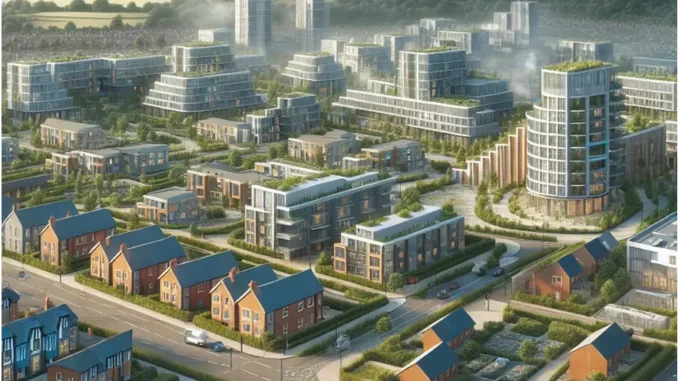
Seated in a quaint café on the fringes of Stevenage, I engaged in a compelling discussion with Martin Fletcher, a seasoned expert in urban planning and development. As a senior advisor on housing policy, Martin has played a pivotal role in shaping the vision for new towns across the United Kingdom. Our conversation provided a profound insight into the complexities and opportunities presented by Labour’s ambitious manifesto pledge to realise “the biggest increase in social and affordable housebuilding in a generation.”
Focus360 Energy: property compliance services – pre-planning to post-construction. Learn more.
Reflecting on historical precedents, Martin recalled the 1950s and 1960s under Harold Wilson’s leadership as a golden era for public sector housebuilding. “Back then, we witnessed an extraordinary surge, with over 300,000 houses constructed annually,” he reminisced, lightly stirring his coffee. “It was a period of unparalleled growth, one we have struggled to replicate in subsequent decades.”
Our dialogue swiftly transitioned to the current housing landscape, where Martin articulated the obstacles hindering similar advancements today. “The curtailment of housebuilding by development corporations and local authorities in the early 1980s marked a significant shift,” he explained, pointing to the surrounding area, itself a testament to post-war urban planning. “Since then, the private sector has taken the lead, but it’s proven insufficient to meet the demands.”
Martin further delved into the limitations faced by private developers, particularly concerning absorption rates. “They are constrained by the need to maintain stable house prices, resulting in a gradual release of homes into the market,” he continued. “It’s a classic case where private incentives clash with public necessity, slowing down the pace of delivery.”
Turning our focus to the construction industry, Martin described it as lagging behind its European counterparts. “Modernisation is imperative,” he stated emphatically. “We need to embrace off-site construction, improve training, and increase the pool of skilled labour. The Brexit-driven pressure on resources has only exacerbated these challenges, leaving us in a bottleneck.”
Yet, despite these hurdles, Martin expressed optimism regarding the potential of new towns as a viable solution. “New towns offer a unique opportunity to transcend private sector limitations,” he observed, his enthusiasm reminiscent of his formative years in the field. “Public sector development corporations can prioritise the provision of genuinely affordable housing.”
Labour’s manifesto aligns with this vision, proposing the establishment of new communities through collaboration with local authorities. “The New Towns Taskforce, led by Sir Michael Lyons and Dame Kate Barker, is charged with identifying suitable locations for these developments,” Martin noted. “This approach harks back to the ambitious post-war initiatives that gave rise to towns like Milton Keynes and Stevenage.”
We contemplated the potential advantages of this strategy, particularly its capacity to overcome the “hope value” dilemma—an obstacle in land acquisition that Martin underscored. “By capturing the development value uplift from greenfield sites, new towns can channel resources towards public benefit rather than private gain,” he explained.
As our discussion drew to a close, Martin reflected on the wider implications of these housing policies. “The emergence of new towns will not happen overnight,” he cautioned. “However, they present a long-term solution to our housing crisis. Quick government fixes may increase planning permissions, but without public engagement and strategic foresight, we risk alienating communities.”
Martin’s final thoughts resonated profoundly: the promise of new towns offers hope in addressing the UK’s housing shortfall, but it necessitates meticulous planning and public endorsement. As he finished his coffee, he left me with a parting sentiment, “Constructing homes transcends mere bricks and mortar; it’s about fostering communities where individuals can flourish. That’s the enduring legacy we should strive for.”
Echoing Martin’s insights, it becomes evident that while Labour’s housing ambitions are laden with challenges, the potential rewards are substantial. New towns could unlock a new era in UK housebuilding, reminiscent of the transformative post-war period. This journey is undoubtedly one to observe closely.


Be the first to comment